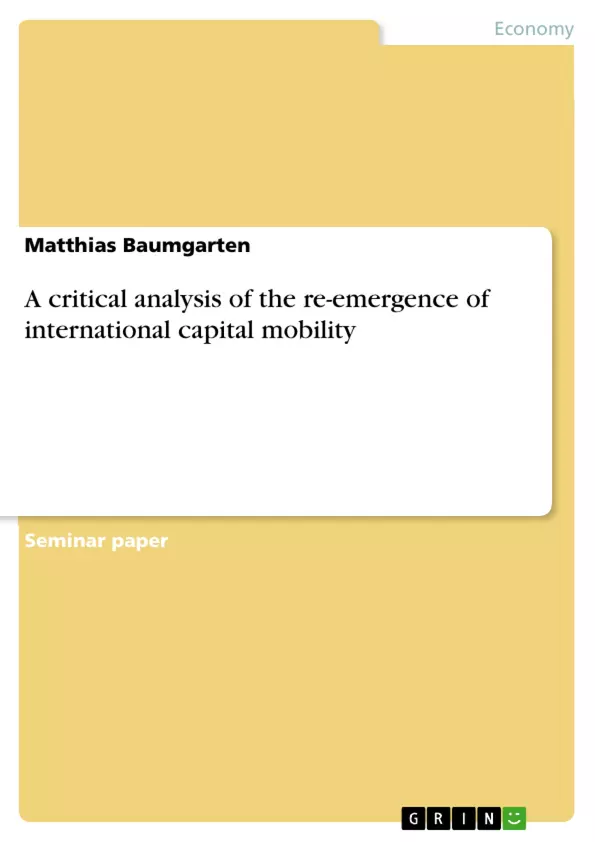From the days of the Bretton Woods Agreements to the beginning of the subprime crisis, the world witnessed an impressive resurrection of global finance and with it the re-emergence of international capital mobility (ICM).
But the phenomenon of
ICM is a contested issue among commentators. While some almost go as far as denying its existence, the most widespread discourse portrays ICM as a powerful external force, putting pressure on the state to adopt capital-friendly policies and reduce welfare expenditures. This notion of forced competition among states is manifested in the “capital mobility hypothesis”, which draws a parallel between the
rise of ICM and its structural power to constrain the state. The following essay argues that this functional connection is not necessarily given, as the mobility of capital is derived from technical, financial and regulatory sources, while its power originates from discursive mechanisms.
By looking at historical developments, it is shown that ICM did indeed re-emerge. But a close examination of the constraints it poses on the different categories of the state reveals that the latter retains significant “room to move”. To understand where the premise of the “capital mobility hypothesis” comes from, ICM is analyzed through discursive institutionalism. A number of relevant
discourses are examined and it is concluded that the state itself plays a substantial role in creating and maintaining the idea of ICM’s power.
Inhaltsverzeichnis (Table of Contents)
- Introduction
- The re-emergence of international capital mobility
- ICM is most suitably described as the capacity of capital to move within a given country and across jurisdictional boundaries without significant frictions
- The constraints imposed on the state's policy autonomy by ICM
- Discursive Institutionalism and the construction of ICM's power
Zielsetzung und Themenschwerpunkte (Objectives and Key Themes)
This essay analyzes the re-emergence of international capital mobility (ICM) and examines the relationship between ICM and state autonomy. It explores the notion that ICM is a powerful external force that constrains states, particularly the "capital mobility hypothesis." The essay argues that ICM's power is not inherent but rather a product of discursive mechanisms, and that the state plays a significant role in creating and maintaining the idea of ICM's power. Key themes of the essay include:- The re-emergence of international capital mobility (ICM) after the Bretton Woods era
- The relationship between ICM and state autonomy
- The "capital mobility hypothesis" and its implications for state policy
- The role of discourse in shaping the perception of ICM's power
- The state's agency in creating and maintaining discourses about ICM
Zusammenfassung der Kapitel (Chapter Summaries)
Introduction
This chapter introduces the concept of international capital mobility (ICM) and its significance in the context of globalization. It discusses the historical context of ICM, tracing its development from the Bretton Woods era to the current period. The chapter also introduces the "capital mobility hypothesis," which argues that ICM exerts a powerful constraint on state autonomy, forcing states to adopt capital-friendly policies.The re-emergence of international capital mobility
This chapter defines ICM as the capacity of capital to move freely across jurisdictional boundaries without significant frictions. It examines the historical evolution of ICM, highlighting its emergence in the pre-war gold standard era, its decline during the Great Depression and World War II, and its re-emergence after the Bretton Woods era. The chapter also discusses the sources of ICM, including advances in technology, financial innovation, and liberalization of domestic capital markets.The constraints imposed on the state's policy autonomy by ICM
This chapter analyzes the impact of ICM on state autonomy. It discusses the constraints that ICM poses on state policy choices, particularly in relation to monetary policy, fiscal policy, and social welfare programs. However, it also argues that the state retains significant "room to move" and is not completely powerless in the face of ICM.Discursive Institutionalism and the construction of ICM's power
This chapter examines the discourse surrounding ICM and its impact on the perception of its power. It uses the framework of discursive institutionalism to analyze how the state itself has contributed to the construction and maintenance of the idea of ICM as a powerful force. The chapter argues that the state has actively shaped discourses about ICM to advance its own political goals.Schlüsselwörter (Keywords)
This essay examines the concept of international capital mobility (ICM) and its impact on the state, focusing on the "capital mobility hypothesis," which suggests that ICM constrains state autonomy. The essay utilizes the framework of discursive institutionalism to analyze the role of discourse in shaping the perception of ICM's power, highlighting the state's agency in creating and maintaining these discourses. Key terms include international capital mobility, state autonomy, capital mobility hypothesis, discursive institutionalism, discourse analysis, and globalization.Frequently Asked Questions
What is International Capital Mobility (ICM)?
ICM refers to the capacity of capital to move across jurisdictional boundaries without significant frictions, a phenomenon that re-emerged strongly after the Bretton Woods era.
What does the "Capital Mobility Hypothesis" state?
It suggests that the rise of ICM acts as a powerful external force that pressures states to adopt capital-friendly policies and reduce welfare expenditures to remain competitive.
Does ICM truly strip states of their policy autonomy?
The essay argues that while ICM poses constraints, states still retain significant "room to move" in areas like monetary and fiscal policy.
What is the role of "Discursive Institutionalism" in this context?
It is a framework used to analyze how the power of ICM is constructed through discourse. The paper concludes that states themselves help maintain the idea of ICM's overwhelming power.
How has ICM evolved historically?
ICM peaked during the gold standard era, declined during the Great Depression and World War II, and saw a massive resurrection in global finance from the 1970s onwards.
- Quote paper
- Matthias Baumgarten (Author), 2011, A critical analysis of the re-emergence of international capital mobility, Munich, GRIN Verlag, https://www.grin.com/document/182620



